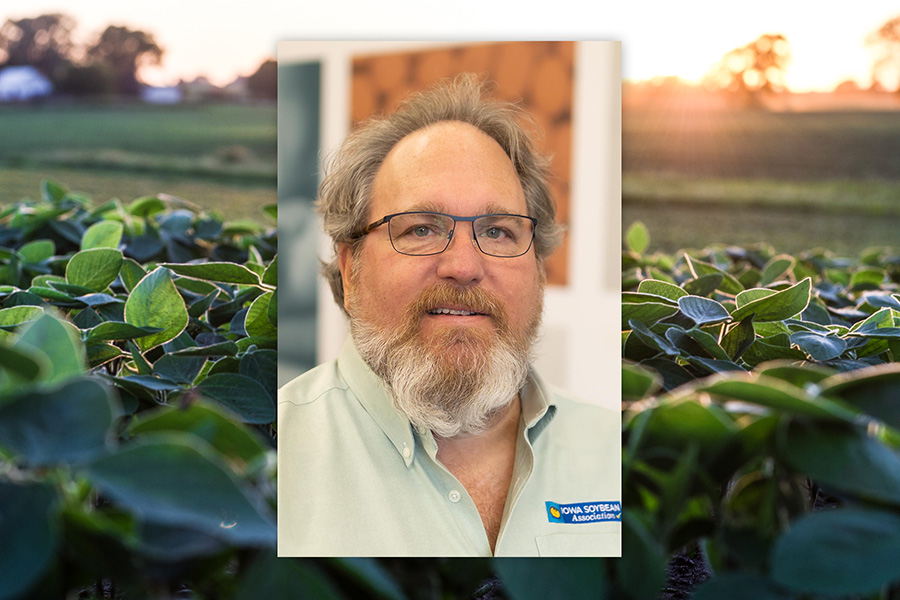
(Photo: Iowa Soybean Association / Joclyn Bushman)
Delivering conservation programs to Iowa farmers
November 1, 2023
As one of the nation’s leading row crop organizations, the Iowa Soybean Association’s (ISA) farmer leadership supports the Research Center for Farming Innovation’s (RCFI) robust programming, directly helping farmers be more productive, profitable and sustainable.
As the RCFI Director of Conservation, I oversee a group of highly qualified staff, deploying projects and programs originating out of the headquarters in Ankeny. Our conservation programs support our farmers by addressing goals to improve soil and water quality, reduce soil erosion and nutrient loss and improve habitat.
We implement this work in conjunction with RCFI’s agronomy research and analytics and insight staff to ensure robust data and information are used to assist with decision-making. As we work to support farmers, we also engage numerous partners and collaborators such as ag retailers, university researchers, local county officials and state and federal agencies.
Todd Sutphin, conservation program lead and Mike Gilman, conservation agronomy lead, oversee the teams working directly with farmers.
“We feel local natural resource and management issues are best addressed at the local level,” says Sutphin. “At RCFI, we help provide better information and data for decision making. The best outcomes are when farmers are active participants and can help drive production, profitability and sustainability.”
RCFI’s conservation programs provide farmers access to technical and financial assistance, helping drive the implementation of on-farm conservation practices across Iowa. RCFI’s conservation professionals provide support for project planning, development and implementation of practices for continual improvement of soil, water and habitat aligning with farmer operator and landowner goals.
Water management strategies and services
RCFI’s team of experts also provide water management strategies and services. This includes support for watershed planning, research and technical consultation on drainage water management; water monitoring program design, sampling, laboratory data analysis and interpretation and technical support for edge-of-field practice placement and implementation.
For the last two decades, ISA has supported watershed programming and planning efforts to generate a local place-based implementation project to improve water quality while also supporting agricultural production. This work emphasizes locally-led watershed planning efforts with farmers as active participants. Watershed programming often leads to securing additional financial support that provides outreach and technical assistance. Backed by data analytics, watershed farmers increase the adoption of conservation practices to improve water quality and aquatic habitat in watersheds across Iowa.
RCFI is researching and providing technical consultation support for drainage water capture and recycling projects. This work is designed to help with field drainage water management, outlet capacity concerns, drive improvements in water quality and address downstream flooding challenges. Work also supports the deployment of edge-of-field practices, such as tile-line bioreactors and saturated buffers placement and implementation. These efforts improve crop production benefits and address impacts on nutrient delivery and downstream water quality.
ISA has a State of Iowa-certified lab located at our headquarters in Ankeny. The lab provides coordination and consultation on water monitoring program design and services supporting the collection and interpretation of water quality data. This builds knowledge of current water conditions, providing valuable insights into water quality.
Habitat integration services
Technical specialists assist farmers by assessing ways they can use marginal or unproductive land to develop wildlife and species habitats. Integrating habitat on the farms also help achieve conservation benefits. RCFI support includes practice placement, planning, design and assistance. Practices include the construction of stream oxbow restorations and pollinator plantings.
Conservation agronomists
Conservation agronomists serve Iowa farmers and landowners by helping identify, plan and implement proven water quality and soil conservation practices and agronomic expertise to enhance productivity and profitability. Conservation agronomist positions are aligned and partnered with ag retail outlets across Iowa providing farmers with one-on-one support to successfully implement conservation practices on their farms. Farmers benefit by having data and information about how to successfully integrate practices into their operation as well as assistance with securing public and private financial support.
“These conservation agronomists have a wealth of knowledge in agronomic principles and conservation practices,” says Gilman. “They consult with farmers on a one-on-one basis and tailor those conservation practices to fit each farmer’s unique farm operation. All of this while ensuring we meet our productivity, profitability and sustainability goals for the Iowa farmer.”
For more information on RCFI conservation and research activities, visit our website at iasoybeans.com/research.
Back